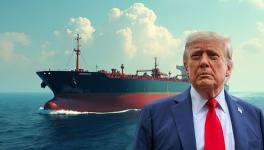There’s no Miracle Solution to Ukraine Conflict
German Chancellor Angela Merkel, left, French President Emmanuel Macron and Russia’s President Vladimir Putin chat during a press conference after a summit on Ukraine at the Elysee Palace in Paris on December 9, 2019. Photo: AFP/Charles Platiau
Heart disease affects lifestyles and impairs the body from functioning. To be sure, the powerful metaphor used by French President Emmanuel Macron to characterize the Ukraine conflict – “a wound in the heart of the European continent” – was an apt description of the high-stakes Normandy Four summit at the Elysee Palace in Paris, which he hosted on Monday.
Like heart disease, there is no quick remedy to the Ukraine conflict. But the persistent symptoms in European politics, which manifested in the NATO summit last week in London, cannot be left unattended either.
Out of fear that the 70th-anniversary summit of NATO might entail the issuance of a joint communique, the alliance downgraded the historic occasion to a mere leaders’ meeting. A condition akin to angina grips the transatlantic alliance.
The Ukraine conflict has tied the West’s relations with Russia into knots. It triggered sanctions against Russia and cast Moscow in an enemy image.
Arguably, it reinforced the transatlantic relationship between the US and Europe for a while, but only until US President Donald Trump arrived and spoiled the party, as he slighted the self-esteem of ‘Old Europe’ and gave impetus to a European rethink.
Coherent approach needed
Dissenting voices have appeared in Europe doubting and increasingly questioning the wisdom of alienating Russia. But the anti-Russia sanctions remain a veritable reality, and Europe lacks a coherent approach toward Russia.
Meanwhile, Washington began bracketing Russia and China as its principal adversaries and introduced it into NATO’s agenda.
In geopolitical terms, France has become the principal dissenter, Russia ties being historically a mainstay of its influence in the continent. In a widely analyzed interview with The Economist magazine last month, Emmanuel Macron lamented that NATO was suffering a “brain death” and that Washington was showing signs of “turning its back on us.”
Macron, whose global disposition increasingly resembles that of Charles de Gaulle, senses that it is in France’s interests to balance its relations with the West and Russia – to “retie Russia to Europe,” as he put it. And he sees in Vladimir Putin a “child of Saint Petersburg,” the Russian capital on Neva built by Peter the Great, as a window onto the West.
Added to this, of course, is a raft of growing tensions between France and Germany – although when it comes to Ukraine, Angela Merkel sees the Minsk process as her political legacy too. Suffice to say, paradoxically, conditions have never been more complicated – and more opportune – to untie the Ukraine knot by addressing the conflict in Donbas.
On the minus and plus sides each, three factors can be counted. No doubt, a frozen conflict in Ukraine serves US interests; former Warsaw Pact countries of Central Europe and the Baltics share the US skepticism about constructively engaging with Russia – apart from Ukrainian ultra-nationalists who militate against any reconciliation whatsoever with Russia.
Compelling factors
And thirdly, the vexed issue of the annexation of Crimea, which Moscow will never agree to undo but is the apple of discord stuck in the throat, originally prompting the European sanctions against Russia.
On the plus side, however, there are compelling factors, too. Ukrainian President Volodymyr Zelensky secured a massive mandate to resolve the conflict in Donbas and improve relations with Russia, the European Union and NATO are not seeking Ukraine’s accession in a near term and President Trump, unlike his predecessor Barack Obama, is ambivalent on the Ukraine question.
This, in turn, creates space for the Normandy Four – France, Germany, Russia and Ukraine – to take the present initiative to implement the Minsk accords on the basis of the so-called ‘Steinmeier Formula,’ which envisages a ceasefire in Donbas, constitutional reform by Kiev to grant autonomy to the separatist regions, followed by elections under international supervision.
The Normandy Four summit on Monday made a modest but significant beginning to revive the Ukraine peace process. There was convergence on three core areas: an ‘all-for-all’ prisoner exchange and a permanent ceasefire by the end of the year. Plus a reaffirmation of 2015 Minsk agreements – which visualize Ukrainian legislation on constitutional reform and Kiev regaining control of separatist regions after the holding of local elections – and agreement to hold another summit of the Normandy Four after four months.
Indeed, differences remain – principally, in regard to the phasing (sequencing) of security and political conditions for the holding of local elections. But Macron sounded cautiously optimistic that the coming four months could improve the overall climate and narrow the differences between Ukraine and Russia.
He admitted with great frankness: “We saw the differences today. We didn’t find the miracle solution, but we have advanced on it.”
The meeting between Putin and Zelensky, their first, on the sidelines of the Paris summit, can also be counted as a positive development. Moscow sees Zelensky’s desire for peace as genuine.
Walking a fine line
Putin’s offer that the price of gas for industrial consumers in Ukraine may be 25% lower, if Moscow and Kiev agree on “joint honest work,” can be seen as a thoughtful move to strengthen Zelensky’s hand.
Russia has to walk a fine line in strengthening Zelensky’s capacity to negotiate with it, without being patronizing. Putin is a pragmatist, but in this case he is not at liberty to be proactive.
The best outcome for Russia would be the implementation of the Minsk Accords leading to the reintegration of the Donetsk and Lugansk regions into Ukraine, but with considerable powers of autonomy, which enable those regions to maintain special relations with Russia and have a say in Kiev’s external policies.
Moscow scored a symbolic victory insofar as the Paris summit steered clear of the Crimean issue. Most important, Macron’s audacious push to dispel the overwhelmingly strong anti-Russian sentiment in the West serves Moscow’s interests. The Paris summit cannot but help set the stage for Russian Foreign Minister Sergey Lavrov’s call on Trump in the White House this week.
Get the latest reports & analysis with people's perspective on Protests, movements & deep analytical videos, discussions of the current affairs in your Telegram app. Subscribe to NewsClick's Telegram channel & get Real-Time updates on stories, as they get published on our website.
























